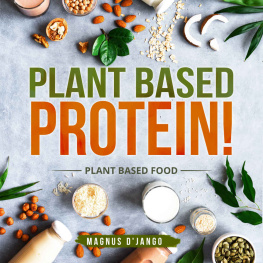The Plant-Based And High-Protein Guide To Increase Muscle Mass With Healthy And Whole-Food Vegan Recipes To Fuel Your Workouts
Introduction
What Entails A Plant-Based Diet
The plant is a good source of closely all the nutrients required by the human body. Plant based diets include fruits, vegetables, nuts, whole grain, and legumes. These are basically plant based foods and hole foods. With the realization of the various health benefits attributed to plant proteins, people have shifted from consuming animal foods to plant-based foods. Plant based diet includes all unprocessed plant foods. It excludes the consumption of processed foods such as pasta and sugars. It excludes processed fruit juices, milk and milk products, all forms of meat (white and red), and eggs.
Foods To Keep Off When On A Plant-Based Diet Are As Follows;
Avoid eating processed foods such as pasta and canned foods. Instead, go for fresh and whole foods. Processed foods are low in their fiber content; they also have other additives such as sugar, salt, preservatives, excess oils, and fats. These foods are linked to the development of chronic illnesses such as cancer, diabetes, hypertension, kidney disease, and heart problems, among others. These foods are also a significant contributor to obesity and weight challenges.
Plant based diet excludes all animal products such as eggs, milk products, poultry, red meat, fish, and any other foods obtained from animals. Animal products are linked to the development of cancers in the human body, especially the heme iron contained in red meat. When animal products are cooked up to certain temperatures, they emit carcinogenic compounds that lead to development of cancer cells. These foods are also a major contributor to weight gain. Research has shown that it is rather a difficulty to watch weight while still on animal products. Animal related foods are also high in their fat contents and have zero fiber. Consumption of animal products leads to heart problems and hypertension as a result of clogged blood vessels. Their low fiber content makes it a cause of stomach problems such as indigestion and diarrhea.
Avoid the consumption of fast foods such as fries, burgers, cakes, ice cream, and pizza, among others. Fast foods have contents such as processed sugars and high sodium content, high fat content. These foods induce cravings in your body that lead to excessive eating and obesity. The foods are also very unhealthy as they contribute to increased risk of chronic illnesses such as cancer, hypertension, diabetes, heart problems, among others. Fast foods are also low in their nutrient content. Being addictive, when a person forms a habit of consuming fast foods, their bodies go low on some essential nutrients such as vitamins and minerals. They also contain additives that you do not want to put in your bodies due to their toxic nature.
Health Benefits Of Plant Diets
Plant foods offer a wide range of advantages over animal foods. They are scientifically recommended for healthy living as they promote a persons wellbeing. By eating plant-based foods, a person is able to reduce the risk of certain illnesses and avoid problems associated with overweight/obesity.
Plant foods are advantageous in their low fat and calorie load. They are also dense in their protein content. Proteins are excellent in helping a person watch weight as they prevent the gaining of body fat. By consuming plant proteins, a person produces more weight limiting hormones. Proteins also help in weight reduction by reducing the feelings of hunger while at the same time increasing the metabolic rate of the body.
By consuming plant products, a person reduces the risk of being overweight. Plants offer excellent sources of fiber, antioxidants, minerals, and vitamins. Plant foods are mainly high in fiber which is helpful in digestion as it limits the amount of sugars absorbed in the digestion process. The fiber in plant foods is also helpful in reducing cholesterol by preventing the absorption of fats in the foods we take. Fiber also helps in preventing constipation in enhancing the digestion of foods. It helps in the stimulation of the various digestive organs to produce important digestive juices. Enough intake of dietary fiber prolongs the amount of time food takes to move through the canal, increasing the absorption of minerals and vitamins in the food. It also prevents diarrhea and excessive hardening of stool.
Research has also confirmed that people who take foods high in fiber are at a lower risk of gaining weight. By consuming foods high in fiber, a person reduces the chances of developing type 2 diabetes. The reason behind the fiber preventing the occurrence of type 2 diabetes is the ability of the fiber to reduce the amounts of sugar the body absorbs maintaining a healthy blood sugar level.
It is also attributed to lowered cholesterol and reduced risk of developing heart disease. The fiber in the digestive system also clumps fats reducing the rate at which they are digested and absorbed in the body. Healthy bacteria in the gut thrive on soluble fiber. The bacteria microbiome feeds on the remains of fermented fiber in the digestive system. These bacteria help in the production of short-chain fatty-acids that help in reducing cholesterol in the body. The short chain fatty-acids also promote good health by reducing inflammation in the body. Inflammation is a risky condition linked to the development of serious illnesses such as cancer among others.
Plant foods reduce the risk of cancers, such as colorectal cancer. While animal foods are found to increase the risk of cancer, plants contain phytochemicals and antioxidants that reduce the risk of developing cancer while at the same time fighting the progress of cancer cells. The fiber found in plant foods is also helpful in detoxification of the body. The detoxification process is aided by both soluble and insoluble fiber. The soluble fiber absorbs the excess hormones and toxins within the body, preventing them from being taken up by the cells. Insoluble fiber works by preventing the absorptions of toxins fond in the foods we consume from the digestive track. It also increases the time which food takes to go through the digestive track. The process is said to reduce the body's demands for more food. The soluble fiber also stimulates the production of certain components that reduce the feelings of hunger which include peptide YY, peptide-1, and cholecystokinin.
When a person is on a plant-based diet, they cut on their consumption of processed foods and refined sugars that are harmful to the body. These sugars promote weight gain by increased food cravings and the production of certain hormones that induce the body to crave for food. These sugars and other additives found in processed food also increase the risk of cancer and among other illnesses.
Plant foods are also rich in certain components that are found to possess anti-oxidation properties while also working in reducing cholesterol levels in the body. These components are polyphenols, such as flavonoids, stilbenoids, and lignans. For instance, green tea, which is most commonly used for its anti-oxidation properties is rich in (epigallocatechin gallate) a flavonoid responsible for the production of the fat burning hormone.
Another beauty of eating plant foods is that you worry less about overeating. The plant foods contain limited calories and negligible levels of harmful fats. According to research, persons who eat plant foods live longer as compared to those that feed on animal foods. Plants foods not only improve the quality of life by protecting a person from illnesses but also lower the risk of early deaths resulting from these illnesses and health conditions.











